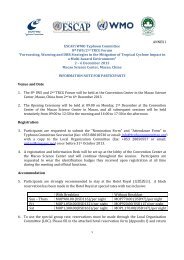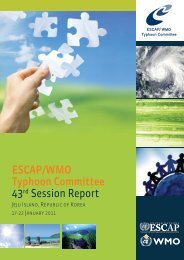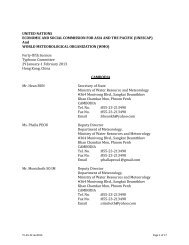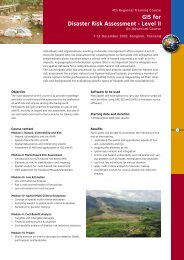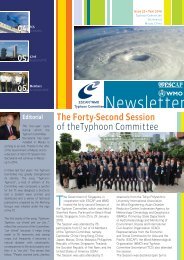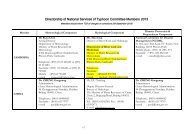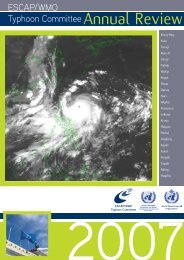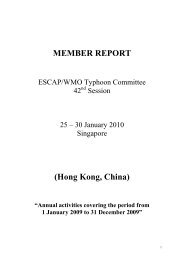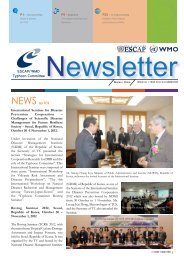TCAR - Typhoon Committee
TCAR - Typhoon Committee
TCAR - Typhoon Committee
You also want an ePaper? Increase the reach of your titles
YUMPU automatically turns print PDFs into web optimized ePapers that Google loves.
104<br />
ESCAP/WMO<br />
<strong>Typhoon</strong> <strong>Committee</strong> Annual Review 2009<br />
- Deduction and selection of flood control<br />
measures that rely on the experience of experts;<br />
- Absence of a unified procedure or system;<br />
- Estimation of the economical efficiency of flood<br />
control measures based solely on structural<br />
damage.<br />
Moreover, criteria for selecting certain flood<br />
control measures over others are unclear,<br />
giving rise to considerable vagueness and<br />
confusion. Although basin-unit flood control has<br />
been attracting more attention since the launch<br />
of the integrated basin flood control project,<br />
an integrated process or system is yet to be<br />
developed for assessing and preparing basinunit<br />
flood control plans.<br />
The eventual objective of this research is<br />
to establish a standardized and integrated<br />
assessment system for flood control measures,<br />
- Construction of a reasonable and integrated flood control measure assessment system;<br />
- Utilization as a future pre-assessment system;<br />
- Enhancement of international cooperation among Members in the region.<br />
so that these measures can ultimately find<br />
practical use in Member countries of the TC<br />
community to reduce socio-economic damage<br />
caused by typhoons and floods in the region.<br />
The assessment system may make it possible<br />
to implement pre-assessment steps to select<br />
economically optimal flood control measures,<br />
which would then enable Member countries to<br />
develop their own capacity against floods while<br />
also strengthening international cooperation<br />
among Members.<br />
- Proposal of a scheme for an integrated<br />
assessment system of flood control measures;<br />
- Establishment of a scheme to select economically<br />
optimal flood control measures;<br />
- Construction of a viable assessment system for<br />
<strong>Typhoon</strong> <strong>Committee</strong> Members.<br />
Since its inception, the project has surveyed<br />
and analyzed the current status of flood control<br />
measures in Korea and Member countries<br />
including several developed countries. To<br />
understand the weaknesses of each existing<br />
assessment system or framework, information<br />
was collected on flood response measures<br />
from major related organizations. It was also<br />
necessary to analyze each flood control<br />
measure assessment system implemented by<br />
developed countries and Members. Analysis<br />
was conducted of each Member’s needs and<br />
expectations regarding such an assessment<br />
system, as well as technical information and data<br />
required to build such a system to help design<br />
a preliminary assessment system. This was<br />
followed by constructing a database to manage<br />
inputs/outputs of each assessment factor. Finally,<br />
a basic design for the assessment system was<br />
developed upon which to devise a master plan<br />
for a flood control measure assessment system<br />
that will eventually satisfy the identified goals and<br />
requirements.<br />
As mentioned above and shown in Fig. 28,<br />
the goal of this project is not only to evaluate<br />
structural measures, but also to propose a<br />
process and methodology to properly determine<br />
flood discharge in basins and river channels<br />
and non-structural measures such as gradation<br />
of protection levels according to flood control<br />
regions and allocation of flood discharge.<br />
Research and analysis are currently under way on<br />
hydrological results and socio-economic impacts<br />
caused by each existing flood measure. HAZUS-<br />
MH, a standardized system for quantified analysis<br />
and data developed by the US FEMA, serves as<br />
a model of the prospective assessment system<br />
and key reference for this project. HAZUS-MH<br />
enables integrated assessment of flood damage<br />
and unifies operational procedures and systems.<br />
At the same time, HAZUS-MH is equipped<br />
with a general-purpose database structure. By<br />
implementing an analysis of each module, the<br />
assessment system that this project seeks to<br />
realize is being refined.<br />
The project will be completed in 2012 with an<br />
integrated and comprehensive flood control<br />
measure assessment system that will help<br />
minimize socio-economic damage caused by<br />
floods. Ultimately, the final assessment system



